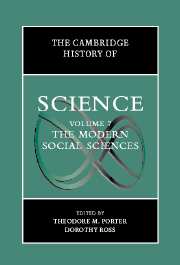Book contents
- Frontmatter
- 1 Introduction: Writing the History of Social Science
- PART I SCIENCES OF THE SOCIAL TO THE LATE NINETEENTH CENTURY
- PART II THE DISCIPLINES IN WESTERN EUROPE AND NORTH AMERICA SINCE ABOUT 1880
- PART III THE INTERNATIONALIZATION OF THE SOCIAL SCIENCES
- PART IV SOCIAL SCIENCE AS DISCOURSE AND PRACTICE IN PUBLIC AND PRIVATE LIFE
- 30 The Uses of the Social Sciences
- 31 Managing the Economy
- 32 Management and Accounting
- 33 Polling in Politics and Industry
- 34 Social Science and Social Planning During the Twentieth Century
- 35 Social Welfare
- 36 Education
- 37 The Culture of Intelligence
- 38 Psychologism and the Child
- 39 Psychiatry
- 40 Gender
- 41 Race and The Social Sciences
- 42 Cultural Relativism
- 43 Modernization
- Index
- References
30 - The Uses of the Social Sciences
from PART IV - SOCIAL SCIENCE AS DISCOURSE AND PRACTICE IN PUBLIC AND PRIVATE LIFE
Published online by Cambridge University Press: 28 March 2008
- Frontmatter
- 1 Introduction: Writing the History of Social Science
- PART I SCIENCES OF THE SOCIAL TO THE LATE NINETEENTH CENTURY
- PART II THE DISCIPLINES IN WESTERN EUROPE AND NORTH AMERICA SINCE ABOUT 1880
- PART III THE INTERNATIONALIZATION OF THE SOCIAL SCIENCES
- PART IV SOCIAL SCIENCE AS DISCOURSE AND PRACTICE IN PUBLIC AND PRIVATE LIFE
- 30 The Uses of the Social Sciences
- 31 Managing the Economy
- 32 Management and Accounting
- 33 Polling in Politics and Industry
- 34 Social Science and Social Planning During the Twentieth Century
- 35 Social Welfare
- 36 Education
- 37 The Culture of Intelligence
- 38 Psychologism and the Child
- 39 Psychiatry
- 40 Gender
- 41 Race and The Social Sciences
- 42 Cultural Relativism
- 43 Modernization
- Index
- References
Summary
The idea of developing social knowledge for the purpose of social betterment assumed its modern form during the Enlightenment. In many respects, the American and French Revolutions were a culmination of that development and the first large-scale “application” of modern social and political theory. At the same time, the revolutions were often interpreted as having brought about a situation in which good social knowledge would permit the steady amelioration of social life. The ways of thinking of the social sciences were also created in that context.
The new, postrevolutionary situation altered the epistemic position of the social sciences, even though this was acknowledged only gradually. Any attempt to understand the social and political world now had to deal with the basic condition of liberty; but an emphasis on liberty alone – as in the tradition of early modern political theorizing during the seventeenth and eighteenth centuries – was insufficient to understand the social order. Thus, in the words of Edmund Burke, if “the effect of liberty to individuals is, that they may do what they please [, we] ought to see what it will please them to do, before we risque congratulations.” The use orientation of the early social sciences consisted in offering a variety of ways of dealing with this situation. Aiming at finding out what it pleased individuals to do, the emerging social sciences embarked on developing empirical research strategies to provide useful knowledge. On the other hand, the concern for the practical order of the world in those social sciences translated into attempts to identify some theoretical order inherent in the nature of human beings and their ways of socializing, namely, the predictability and stability of human inclinations and their results.
- Type
- Chapter
- Information
- The Cambridge History of Science , pp. 535 - 552Publisher: Cambridge University PressPrint publication year: 2003
References
- 4
- Cited by



